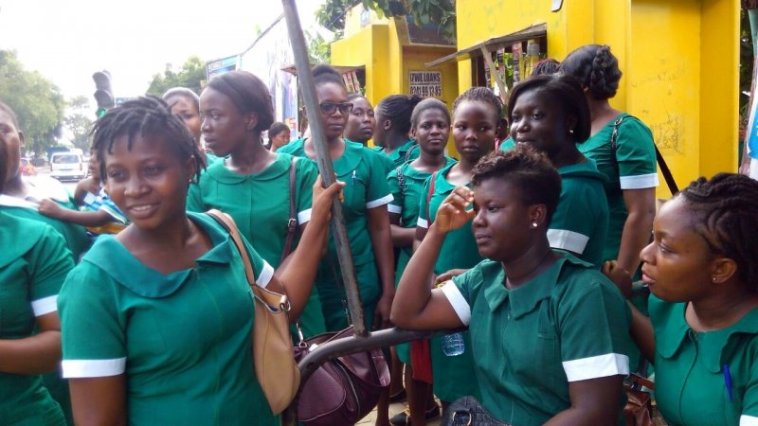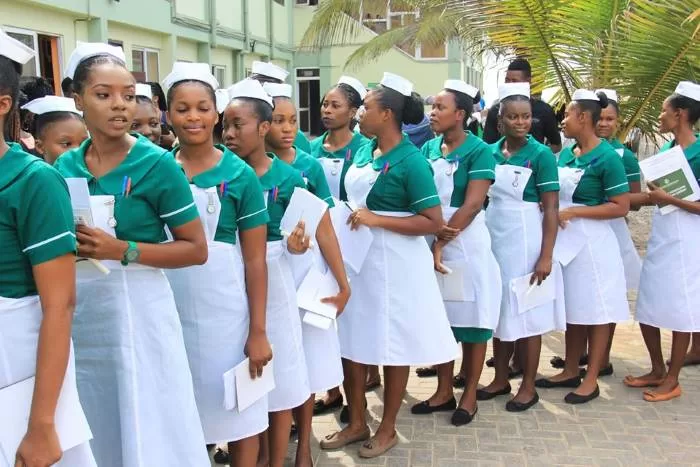 Some parents of children with cerebral palsy have expressed concern about the level of stigmatization in some hospitals in handling children with special needs.
Some of the parents said the stigmatization starts right at the hospitals with the kind of attitudes some health care professionals show towards the children
Mrs Alberta Hammond, a mother of a child with cerebral palsy, who shared her experiences recalled, “all my humiliating and very painful encounters were at the hospital”.
She wondered, “Why do some nurses and matrons insist on weighing my severely underweight child by taking off his clothes and placing him in a white bowl with his legs out in front of all others, why can’t our folders have different features either by colour or by size to tell health professionals who we are and to get some level of extra care?”
Mrs Hammond said hospitals especially the public ones have really hostile environment and much more hostile to a parent of a child with cerebral palsy, explaining that “I do not always have someone going with me to the hospital and it is even very difficult to use the washrooms in the hospital even when I have the urge”
The parents shared their experiences with Dr Abena Tannor, a physical rehabilitation specialist at the Komfo Anokye Hospital prior to a training programme she is organizing for nurses on providing healthcare for children and adolescents with special needs
Mr Solomon Acquah, a father of a child with cerebral palsy said nurses and health care professionals should exercise some patience when dealing with parents of children of cerebral palsy.
“Some of the nurses behave as if you the parents are the cause of the child frequent visit to the hospital when you go to the hospital frequently with seizures or infections, it makes some parents hesitate in taking their children to the hospital anytime they are sick.
Madam Olaide Babalola, a mother of a child with cerebral palsy also said health professionals usually generalize the issues that affects children with cerebral palsy, they should know that no two children with cerebral palsy are the same. They should treat each case as unique and special.
She said health professionals should also share information on the children’s diagnoses at a very early stage even if they are unsure, saying, “Once there is a high suspicion of something not right, parents should be engaged and counseled for early intervention purposes
Mrs Irene Livingstine Acquah, a Carer of a child with cerebral palsy said: “We stopped going to a particular government hospital because of the comments and sometimes the disrespect some health professionals showed towards us.”
Mrs Hannah Awadzi, a mother of a child with cerebral palsy and Founder of the Special Mothers Project, an advocacy and awareness creation programme on cerebral palsy issues said, nurses and health care professionals should not project their religious beliefs on parents of children with special needs.
She said: “Some of them make you feel like, you did not pray enough that is why you have a child with special needs, some sympathy comments are better not made,”
Madam Emelia Gynekel Bawa, a mother of a child with cerebral palsy, called for continuous advocacy on cerebral palsy issues, saying, “I think our noise is getting somewhere, last week my boy was admitted and I marveled at the way the health workers took keen interest in him, the nurse and the doctor was super nice to us. I was very impressed.”
Dr Abena Tannor expressed her gratitude for the concerns raised and said all the issues raised will be factored into her training programmes for health care professionals.
Source: 3news.com | Ghana]]>
Some parents of children with cerebral palsy have expressed concern about the level of stigmatization in some hospitals in handling children with special needs.
Some of the parents said the stigmatization starts right at the hospitals with the kind of attitudes some health care professionals show towards the children
Mrs Alberta Hammond, a mother of a child with cerebral palsy, who shared her experiences recalled, “all my humiliating and very painful encounters were at the hospital”.
She wondered, “Why do some nurses and matrons insist on weighing my severely underweight child by taking off his clothes and placing him in a white bowl with his legs out in front of all others, why can’t our folders have different features either by colour or by size to tell health professionals who we are and to get some level of extra care?”
Mrs Hammond said hospitals especially the public ones have really hostile environment and much more hostile to a parent of a child with cerebral palsy, explaining that “I do not always have someone going with me to the hospital and it is even very difficult to use the washrooms in the hospital even when I have the urge”
The parents shared their experiences with Dr Abena Tannor, a physical rehabilitation specialist at the Komfo Anokye Hospital prior to a training programme she is organizing for nurses on providing healthcare for children and adolescents with special needs
Mr Solomon Acquah, a father of a child with cerebral palsy said nurses and health care professionals should exercise some patience when dealing with parents of children of cerebral palsy.
“Some of the nurses behave as if you the parents are the cause of the child frequent visit to the hospital when you go to the hospital frequently with seizures or infections, it makes some parents hesitate in taking their children to the hospital anytime they are sick.
Madam Olaide Babalola, a mother of a child with cerebral palsy also said health professionals usually generalize the issues that affects children with cerebral palsy, they should know that no two children with cerebral palsy are the same. They should treat each case as unique and special.
She said health professionals should also share information on the children’s diagnoses at a very early stage even if they are unsure, saying, “Once there is a high suspicion of something not right, parents should be engaged and counseled for early intervention purposes
Mrs Irene Livingstine Acquah, a Carer of a child with cerebral palsy said: “We stopped going to a particular government hospital because of the comments and sometimes the disrespect some health professionals showed towards us.”
Mrs Hannah Awadzi, a mother of a child with cerebral palsy and Founder of the Special Mothers Project, an advocacy and awareness creation programme on cerebral palsy issues said, nurses and health care professionals should not project their religious beliefs on parents of children with special needs.
She said: “Some of them make you feel like, you did not pray enough that is why you have a child with special needs, some sympathy comments are better not made,”
Madam Emelia Gynekel Bawa, a mother of a child with cerebral palsy, called for continuous advocacy on cerebral palsy issues, saying, “I think our noise is getting somewhere, last week my boy was admitted and I marveled at the way the health workers took keen interest in him, the nurse and the doctor was super nice to us. I was very impressed.”
Dr Abena Tannor expressed her gratitude for the concerns raised and said all the issues raised will be factored into her training programmes for health care professionals.
Source: 3news.com | Ghana]]>
Health professionals urged to stop stigmatizing children with special needs
Reading Time: 4 mins read
Recent Posts
- Ghanaian sports journalist Naa Shika Stargurl shines on global stage
- Central Regional Minister to go to Court over her dismissal from NPP?
- NPP accuses NDC of lawlessness, demands urgent re-collation by EC in disputed constituencies
- Anytime there’s vigilance, NDC wins – Malik Basintale
- Akufo-Addo statue in Takoradi suffers partial damage amid controversy
- Current financial year proving challenging for COCOBOD – IMF
- Agona West NPP expels Regional Minister, 282 others for anti-party activities
- Cholera outbreak in Western region claims 14 lives, over 800 cases recorded
Popular Stories
-
Agona West NPP expels Regional Minister, 282 others for anti-party activities
-
Central Regional Minister to go to Court over her dismissal from NPP?
-
Akufo-Addo statue in Takoradi suffers partial damage amid controversy
-
Ghanaian sports journalist Naa Shika Stargurl shines on global stage
-
Current financial year proving challenging for COCOBOD – IMF

ABOUT US
Newstitbits.com is a 21st Century journalism providing the needed independent, credible, fair and reliable alternative in comprehensive news delivering that promotes knowledge, political stability and economic prosperity.
Contact us: [email protected]
@2023 – Newstitbits.com. All Rights Reserved.















